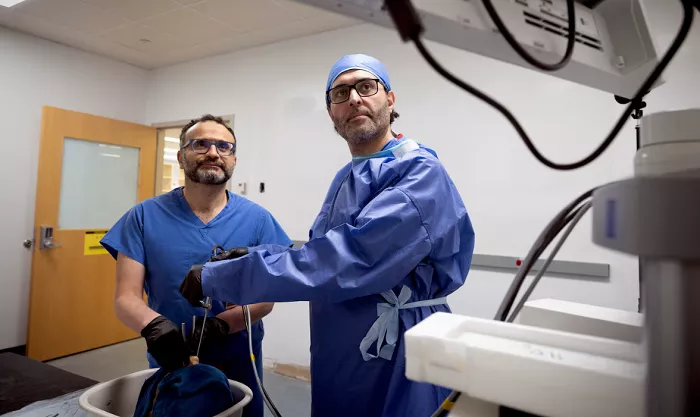Just before 19-year-old Karla Flores was taken into surgery at the University of Maryland Medical Center, she hugged her parents, uncertain if she’d see them again. It would be her third brain surgery in less than a month—and the most dangerous one yet.
Flores had already endured two grueling 14-hour operations to remove a rare bone tumor called a chordoma, about the size of a chicken egg, from her brain. But another tumor remained—this one smaller, yet more dangerous—pressing against her spinal cord near the base of her skull.
After extensive planning, the surgical team made a bold decision: they would access the tumor through her left eye socket, a method never attempted before for this type of condition. It was a high-stakes gamble. A few millimeters off course could leave Flores paralyzed from the neck down—or worse, trigger a fatal brain-stem stroke. But success could mean a breakthrough for patients worldwide with hard-to-reach tumors.
One floor below the operating room, lead surgeon Dr. Mohamed A.M. Labib paused in the hospital chapel. As part of his pre-surgery ritual, he prayed—asking for guidance and peace of mind. “I am only a tool in the hands of God,” said Labib, a practicing Muslim. His faith, he said, helps him stay calm during the life-or-death decisions he makes as a neurosurgeon.
Labib, 46, grew up in Dubai, the son of a gynecologist. At 17, he moved alone to Canada to pursue medical training. He would go on to study under pioneering neurosurgeon Robert Spetzler at the Barrow Neurological Institute in Arizona, where he adopted Spetzler’s motto: “Accept challenges. Reject norms.”
Since arriving in Baltimore in 2021, Labib has built a reputation for taking on cases other surgeons deemed too risky. In one instance, he operated for more than 21 hours across two surgeries to save a woman with five brain aneurysms.
“Sometimes we are captives of our fear,” Labib said. “But fear should push us to ask why we think something is impossible. Just by asking that question, we may find the answer.”
Now, with Flores’s unprecedented eye-socket surgery, he’s proving just how far that mindset can go—offering new hope to patients once thought untreatable.
Related topics:


